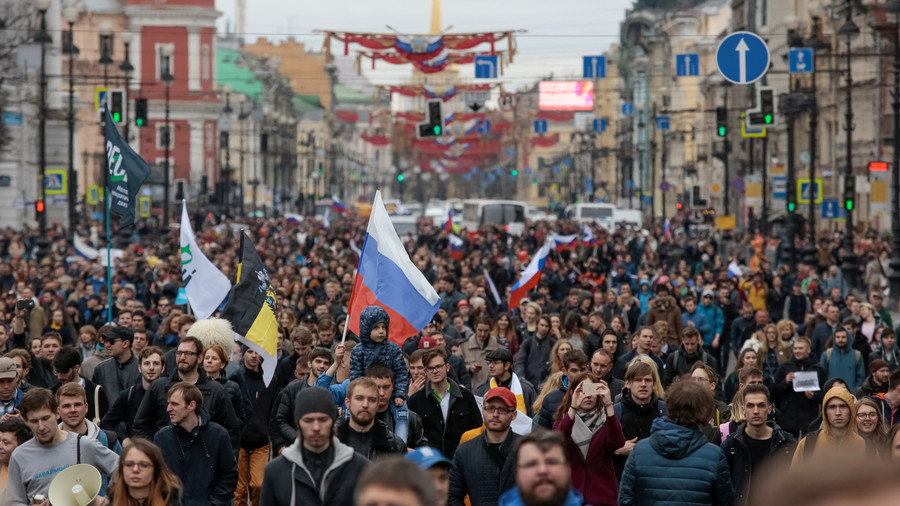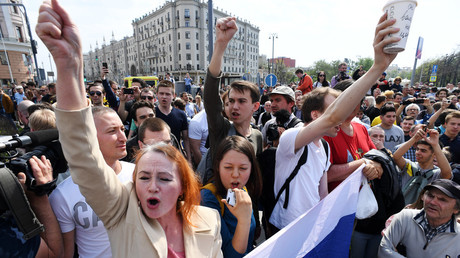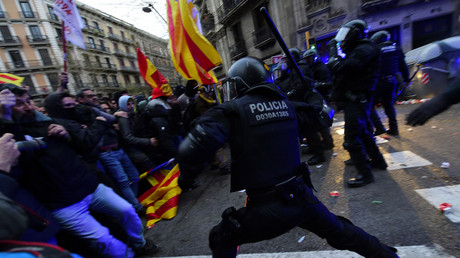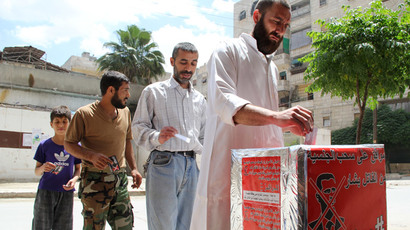The West doth protest too much (about Russian protests)
Neil Clark is a journalist, writer, broadcaster and blogger. He has written for many newspapers and magazines in the UK and other countries including The Guardian, Morning Star, Daily and Sunday Express, Mail on Sunday, Daily Mail, Daily Telegraph, New Statesman, The Spectator, The Week, and The American Conservative. He is a regular pundit on RT and has also appeared on BBC TV and radio, Sky News, Press TV and the Voice of Russia. He is the co-founder of the Campaign For Public Ownership @PublicOwnership. His award winning blog can be found at www.neilclark66.blogspot.com. He tweets on politics and world affairs @NeilClark66

The condemnation by the EU, and others in the West, of police ‘violence’ at an unauthorised opposition rally in Russia, stands in stark contrast with the line taken when protesters are dealt with forcefully in Western countries.
"The detention of over a thousand demonstrators and violence used against them by the Russian authorities across the country today threaten the fundamental freedoms of expression, association and assembly in the Russian Federation," the European Union said in response to events on Saturday.
Pretty principled stuff, eh? Unfortunately, principles go out of the window when the demonstrations take place closer to home. Think back to the anti-austerity protests which spread across Europe a few years ago.
An Amnesty International report in April 2014 found that the Spanish government was using fines, harassment, and excessive force to limit the right to protest.
“With threats of fines or threats of being beaten, the government is trying to stigmatise and criminalise people who are just practising their rights,” the report said.
It cited the case of one Ester Quintana, who was hit by a rubber bullet fired by the police, which caused her to lose her left eye.
‘The police act with complete impunity, while peaceful demonstrators and leaders of social movements are continually harassed, stigmatized, beaten, sometimes arrested to face criminal charges, imprisonment and fines.” Amnesty’s Europe and Central Asia deputy programme director, Jezerca Tigani, said.
Yet the police actions in Spain brought about no fierce condemnation from the EU, or indeed from others who are usually so quick to castigate Russia.
It was a similar story last October when there was a crackdown on pro-independence protesters in Catalonia. Nearly 900 people were injured, some seriously, in clashes with the authorities. “In several cases, the actions of National Police and Civil Guard officers involved excessive and unnecessary use of force, and the dangerous use of riot control equipment, injuring hundreds of peaceful protesters,” John Dalhuisen of Amnesty said.
Examples cited included one officer beating a woman round the neck and face on at least two occasions and another officer punching a man in the face.
The EU did issue a statement, but only 24 hours later. It’s instructive to compare its wording with the one it issued at the weekend about Russia.
It’s very first sentence declared: “Under the Spanish Constitution, yesterday’s vote in Catalonia was not legal.”
Only in the fourth and final paragraph was there an allusion to the protests - but there was no denunciation of the Spanish authorities. The statement said: “We call on all relevant players to now move very swiftly from confrontation to dialogue. Violence can never be an instrument in politics.”
So while the violence was directly laid at the door of the Russian authorities in one statement, in the other, it was presented as applying to “all relevant players.”
To literally add insult to injury, First Vice President of the European Commission Frans Timmermans declared: “It is a duty for any government to uphold the rule of law. This sometimes requires the proportionate use of force.”
But as we saw in Ukraine in 2014, some governments are more equal than others when it comes to being allowed to use “the proportionate use of force.” Hardcore ultra-nationalists and bona fide neo-Nazis provided the cutting edge to protests against the democratically-elected government of Viktor Yanukovych. But while it was OK for protesters to use violence, the government wasn’t supposed to respond. “This is Ukraine’s moment to meet the aspirations of its people or disappoint them,” declared Victoria Nuland of the US State Department.
Just imagine if protesters occupied or blocked government buildings in Washington, as they did in Kiev? You can be sure the US State Department’s line would be rather different.
The double standards are glaring and are there for all to see. Put simply, if the protests are against a government which the Western elites approve of, then brutality by the authorities will be ignored, or even justified, on the grounds that ‘law and order’ must be maintained. In this scenario, it’ll be the protesters who are smeared as ‘thugs’ and ‘anarchists’ - even if they’re all waving joss-sticks and are sandal-wearing disciples of Mahatma Gandhi. But if the protesters are demonstrating against an administration which the Western elites want removed, then anything goes. The protesters can be as violent as they like, they can smash up statues, or even in the case of the US-sponsored ‘regime change’ op against the Socialist government in Yugoslavia in 2000, set fire to government buildings, but they will never be condemned. In this scenario, it’s the government who will be warned: don’t you dare respond with force!
The hypocrisy over unauthorised protests is also off the scale. If I tried to organise, through social media, an unauthorised march against the NeoCon war lobby through central London culminating in a protest outside Parliament, I’d very likely be arrested. Here is the UK law about “letting the police know” about public marches.
It’s the same situation I’d imagine in all other Western nations. To hold a march you must notify the authorities and obtain official permission. But when this happens in Russia, there are expressions of outrage.
People should be able to protest where they want - say those who oppose such a right in their own country. In fact, the Russian authorities say they offered the anti-Putin demonstrators several choices of venue at the weekend, including Sakharov Avenue, where a big protest had already taken place earlier in the week. But opposition figure Alexei Navalny urged his supporters to go somewhere else.
Now, you can either support the right to protest anywhere, or you can oppose it. But what you can’t do - unless you’re a Weapons Grade hypocrite - is support the right to protest anywhere in Russia, but not the same right in Britain, France, or the US. The respective cases of Pussy Riot and Trenton Oldfield are illuminative.
The former were lauded in Western establishment circles after they were arrested and sentenced to two years in jail for bursting into Moscow’s Cathedral of Christ the Saviour and performing an obscenity-laden song which attacked the Orthodox Church’s support for Putin. Madonna, Sting, Peter Gabriel, and the Red Hot Chili Peppers were among the celebs who voiced their support for the “prisoners of conscience,” who were released before term.
There was no such support for Trenton Oldfield. If you haven’t heard of him, that’s not surprising because his case, unlike Pussy Riot’s, didn’t receive international coverage. The Australian was arrested after disrupting the annual Oxford vs. Cambridge Boat Race in London. Rightly or wrongly, he wanted to make a public statement about elitism and poverty - but didn’t get as much sympathy as the Russian punk-rockers. He went to prison for six months and was threatened with deportation.
“Britain was one of the first countries to come out in support of Pussy Riot — so we thought people would stand up for the same thing here,” Oldfield’s wife Deepa said in a newspaper interview.
But she was disappointed. Instead, she noted how politicians intervened to increase her husband’s charge.
If we are serious about protecting free speech then it’s not just about allowing people to protest. It’s about not denying them platforms either. While UK Neocons were attacking Russia for “anti-democratic clampdowns,” there was also glee from the same Neo-McCarthyite witch-hunters that the venue hosting a conference in Leeds critiquing mainstream media coverage of the Syrian conflict had bowed to pressure and decided to cancel the event.
Among the invited speakers were a former British ambassador and two university professors. Imagine the outcry if this blatant act of censorship had happened in Nizhny Novgorod. But it occurred in the UK, so let’s pretend not to notice. The sad truth is that the right to protest, the right to dissent, the right to espouse genuinely anti-Establishment views, is gravely threatened in the West. Before pointing our fingers at Russia, we need to get our own house in order. As the old proverb goes, Medice, cura te ipsum.
Follow Neil Clark @NeilClark66
The statements, views and opinions expressed in this column are solely those of the author and do not necessarily represent those of RT.




0 Comments:
Post a Comment
Subscribe to Post Comments [Atom]
<< Home